UNITED STATES | 31.08.2010
Obama's presidency nears its foreign policy crossroads as criticism grows
In his State of the Union address in January, Obama focused mainly on the pressing topic of the global financial crisis, dedicating just a single paragraph to the war in Afghanistan and approximately three lines to Iraq. He reiterated his desire to start pulling US troops out of Afghanistan by July 2011, eventually leaving the country in a state of democratic self-government and security. There was no mention of victory.
He assured those in attendance on Capitol Hill that the US was "responsibly leaving Iraq to its people" and that the US would "have all of our combat troops out of Iraq by the end of this August." The president addressed the fears of the American people when he concluded his statement on Iraq by saying: "Make no mistake: this war is ending, and all of our troops are coming home."
Another significant foreign policy issue, that of nuclear proliferation - specifically that of Iran - was given a cursory mention. The issue seen as perhaps the most important by consecutive US presidents - peace in the Middle East - was not even addressed.
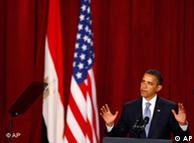 Obama's Cairo speech ushered in his policy of dialogue
Obama's Cairo speech ushered in his policy of dialogue
This was in direct contrast to Obama's most important foreign policy speech given at Cairo University in June 2009. The president spoke of a new US policy of dialogue, diplomacy and consensus - a reversal of the previous administration's interventionist approach - but more specifically, he dedicated more time to the issues he would skip over in January. He introduced his commitment to remove troops from Afghanistan and also pledged to pump billions of dollars into infrastructure, education and security.
On Iraq, he announced his commitment to removing all US troops from the country by 2012 and pledged to help rebuild Iraq, leaving the country with the ability to govern, police and provide for its people without US intervention. "We will support a secure and united Iraq as a partner, and never as a patron," he said.
Most significantly, Obama addressed the situation between the Israelis, Palestinians and the Arab world. While reminding the Cairo audience that the bond between the US and Israel was "unbreakable" he also reaffirmed the US position of supporting a Palestinian state with full sovereign rights. He called on the Palestinians to prove they could govern and to renounce violence and told Israel in no uncertain terms that "the United States does not accept the legitimacy of continued Israeli settlements."
Much has changed since Cairo and Obama's focus has since become dominated by domestic issues such as health care reform and financial regulation, as seen in the priority he gave these topics in his State of the Union speech. However, while he has been fighting for his national agenda at home, the state of his foreign policy objectives have been subject to scrutiny and criticism.
Deteriorating Afghanistan situation weighs heavy on Obama
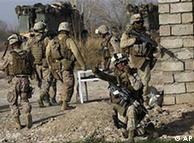 A 2011 withdrawal from Afghanistan looks very unlikely
A 2011 withdrawal from Afghanistan looks very unlikely
The recent Wikileaks scandal, where 90,000 pages of classified material detailing the Afghanistan war were made public online, brought home the reality of the situation on the ground. Far from being in a position to even consider pulling out troops, the security and political environment in Afghanistan appears to be more volatile than ever. It becomes increasingly clear through the leaked documents and testimony from unnamed military sources that the US has grave doubts about the Karzai administration, harbors increasing concerns over the resurgence of the Taliban and faces an potential powder keg situation developing over Pakistan's involvement in the insurgency.
"No-one could expect Obama to solve the situation in Afghanistan in the first two years of his presidency, but the situation has certainly deteriorated in that time, which may or may not have anything to do with Obama's decisions," Thomas Klau, a transatlantic relations expert at the European Council for Foreign Affairs, told Deutsche Welle. "The fact that he has changed his commander there twice and modified the strategy once in two years suggests the mission is not in good shape, and although it's too early to say, this could be an unwinnable war."
"What could haunt Obama is his suggestion that a phased withdrawal of troops could begin in 2011, which looks very unlikely at the moment," he added. "In a year's time, if things are still as bad or even worse, this statement will be shown as being very unwise."
Iraq promises kept but post-US stability looks fragile
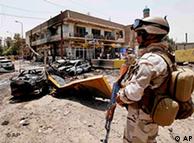 As the US leaves Iraq as promised, instability returns
As the US leaves Iraq as promised, instability returns
The situation in Iraq looks only marginally better but at least Obama has kept one of his main pledges there. True to his word, he has pulled US combat battalions out of Iraq as promised by the end of August 2010, although around 50,000 still remain in country. The full withdrawal of US forces from Iraq by 2012 seems to be on schedule and the end of the war, at least for the US, looks to be in sight.
But while part of the deal has been honored, some experts suggest Obama's own withdrawal timetable has compromised his promise to leave Iraq in a fit and stable state. As the US steps up its withdrawal, Iraq is in political limbo and the country itself teeters once more on the verge of chaos. Despite this, the president still considers his impact on Iraq to have been successful.
"The Obama administration's foreign policy record is very much a mixed bag," Ilan Berman, vice president of the American Foreign Policy Council in Washington, said. "The president can claim credit for revitalizing and refocusing strategy in Afghanistan, although the situation there remains troubled. Also, he can - and has - claimed credit for success in Iraq, despite the fact that his administration's policy is in many ways a holdover of the Bush administration's approach. Beyond that, however, there is little to cheer about."
US seen as a weakened force in Middle East politics
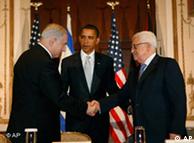 Despite some visible displays, US successes have been few
Despite some visible displays, US successes have been few
One of the major failings of Obama's foreign policy to date has been the Middle East peace process. Obama and his team of diplomats have yet to bring Israel and the Palestinians together in face-to-face talks and Israel has only paid lip service to US demands to halt settlement building in Palestinian territory.
"There is, quite clearly, a perception of American weakness - certainly with regard to its approach to the Middle East," Berman said. "This perception, however, has less to do with the state of US-Israeli relations and more to do with Washington's seeming lack of connection with the Arab and Muslim worlds. More than a year after the president's famous Cairo speech promised a 'new beginning' in US relations with the Islamic world, America has failed to thwart Iran's nuclear ambitions, speak plainly about Islamic radicalism, or project an image of diplomatic resolve in its dealings with the region. All of which has taken a toll on American standing."
"Prospects for an Israeli-Palestinian peace remain dim, despite US diplomatic efforts, because the White House has ignored the serious systemic problems that exist in the Palestinian territories," he added. "A robust American policy to thwart Iran's nuclear program, meanwhile, remains conspicuously absent."
Crucial period for presidency and foreign policy direction
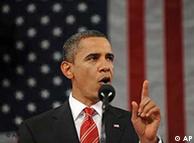 Obama faces tough elections which could force his hand
Obama faces tough elections which could force his hand
With so many minuses in his foreign policy column, the question remains whether President Obama will soldier on with his commitment to engagement or whether he will revert to the interventionist or even isolationist positions of the past. With so much riding on his decision - both domestically and globally - it is a choice he should not make lightly.
"A lot depends on what happens in the mid-term election in the US," said Thomas Klau. "If the Republicans gain a majority in the House or Senate, then this will effectively kill Obama's domestic agenda, leaving international relations as the only real sphere in which he can have any impact. If the Democrats win what would be a surprise success in the elections, then Obama will continue to prioritize domestic issues with only a huge international crisis or event diverting him from that."
Author: Nick Amies
Editor: Michael Knigge
DW-TV EUROPE live
AID CONCERNS
The US is warning that the Taliban may attack government officals and aid workers in Pakistan.
WAR IN SOMALIA
At least 80 people have been killed in Somalia since Al-Shabab declared war on the government.
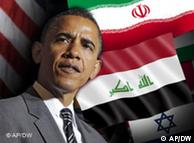










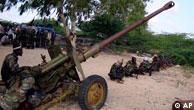





No comments:
Post a Comment